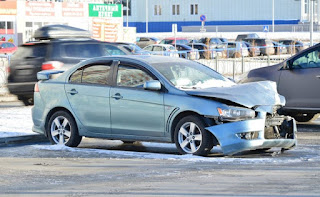What Happens if Someone Hits Your Parked Car?
By Diane Tait
 |
| Image courtesy Pixabay |
If you’ve ever parked your car on the street or in a parking
lot only to come back to find that there’s a big dent in it, then you know the
frustration of a vehicular hit and run. Most
motorists know that whenever their car is involved in an accident, fault is
assessed on the offending driver. The
problem is when the offending driver drives away without so much as an apology,
let alone taking responsibility for the damage done, the question is, what
comes next?
Irresponsible drivers don’t always get away
with murder.
Under ordinary circumstances when your parked vehicle is hit by another
vehicle, the at-fault driver’s insurer pays for repairs to your vehicle and if
necessary, medical coverage to anyone in it who gets injured during the
accident. However, when the offending
driver flees the scene and no witnesses step forward to tell you the make,
model and license number of the vehicle that hit yours, your policy will kick
in to make you whole again. That being said,
if another motorist hits your car and flees the scene, the police will treat the
incident as a hit and run if you report it as such. That fact alone may result in a witness
stepping forward to provide a description of the offending vehicle. It’s also possible that the parking lot has a
closed-circuit video system that could also help identify the culprit. It’s in your best interest to have the
careless driver who hit your vehicle caught and prosecuted, since this will
force him or her to pay for your damages.
1.
Will I pay a deductible on a hit-and-run
claim? – If the offending driver isn’t caught, then you may or may not be forced
to pay a deductible depending on the circumstances. If the only damage is cosmetic, such as a
broken taillight or dented fender, you’ll be required to pay the deductible if
the claim is made under the collision portion of your auto insurance
policy. If you or your passengers
sustain an injury in a parking lot accident where the at-fault driver flees the
scene and you file for compensation for medical expenses under the uninsured
driver portion of your policy (assuming you opted for it), you would not be
required to pay a deductible for that.
2.
Why doesn’t the liability portion of your
auto policy cover a hit-and-run accident? – Unless your parked car damages
another vehicle when your vehicle is involved in a hit-and-run accident, your
liability coverage won’t pay for your injuries or the damage to your
vehicle. That’s because the liability
portion of your policy is dedicated to addressing the injuries to or damages
caused by your vehicle to property that belongs to someone other than yourself.
3.
If you file a hit-and-run claim, will it
cause your insurance costs to rise? – The answer is possibly, since claim
frequency affects what you pay to insure your vehicle. If the accident wasn’t your fault and you
haven’t made any other recent claims, the odds of your insurance rate
increasing are lower than if you filed a claim within the past year.
 |
| Image courtesy flickr |
4.
If someone hits your parked car, what should
you do? – If you happen to be inside your car or witness your vehicle being
struck by another party, first and foremost, don’t get angry. Parking lot accidents do occur on occasion
and the last thing you want to do is have the situation escalate. More importantly, the best way to get
compensated is to make sure you document the accident. That means taking pictures of both vehicles
and collecting the name, address, phone number and insurance info on the other
driver. Even if the at-fault motorist
offers to pay out of pocket, don’t fail to contact your insurance agency right
away, since the other driver may try to renege at a later date. It’s also a good idea to check for witnesses,
since the at-fault driver might try to pin the accident on you. It’s also a good idea to scan the parking lot
for cameras, since a video of the incident will prove beyond a shadow of a
doubt who the guilty party was.
5.
If someone hits your parked car and flees,
what should you do? – If you come back from visiting a friend or
shopping only to discover that your vehicle was damaged and the offending
driver is nowhere to be seen, the first thing to do is to call the police to
report the hit-and-run. The next thing
to do is to try to find out if there were any witnesses to the accident, as
well as scanning for any nearby CCTV cameras.
While you wait for the police to arrive, take photos of the damage and
any debris lying nearby. This will prove
you didn’t cause the damage yourself. Then
call your insurance company to report the damage right away. If you wait until you get home, you could
damage your case which might result in your insurance company listing you as
the at-fault driver.
 |
| Image courtesy pixabay |
Diane Tait
owns and operates A&B Insurance. To find out more about how you can save
money on insurance, go to her site or fill out the form at right.


This is really useful information. Thank you for publishing this.
ReplyDelete